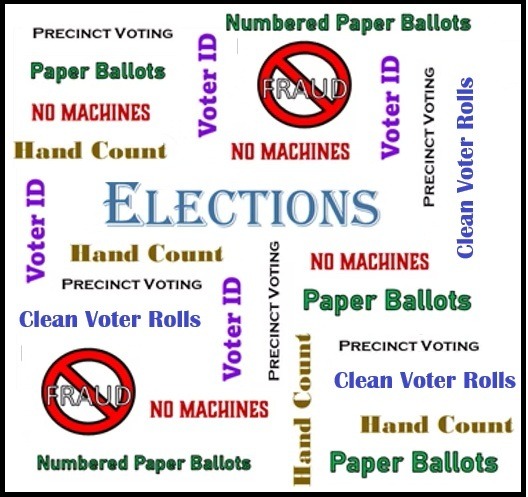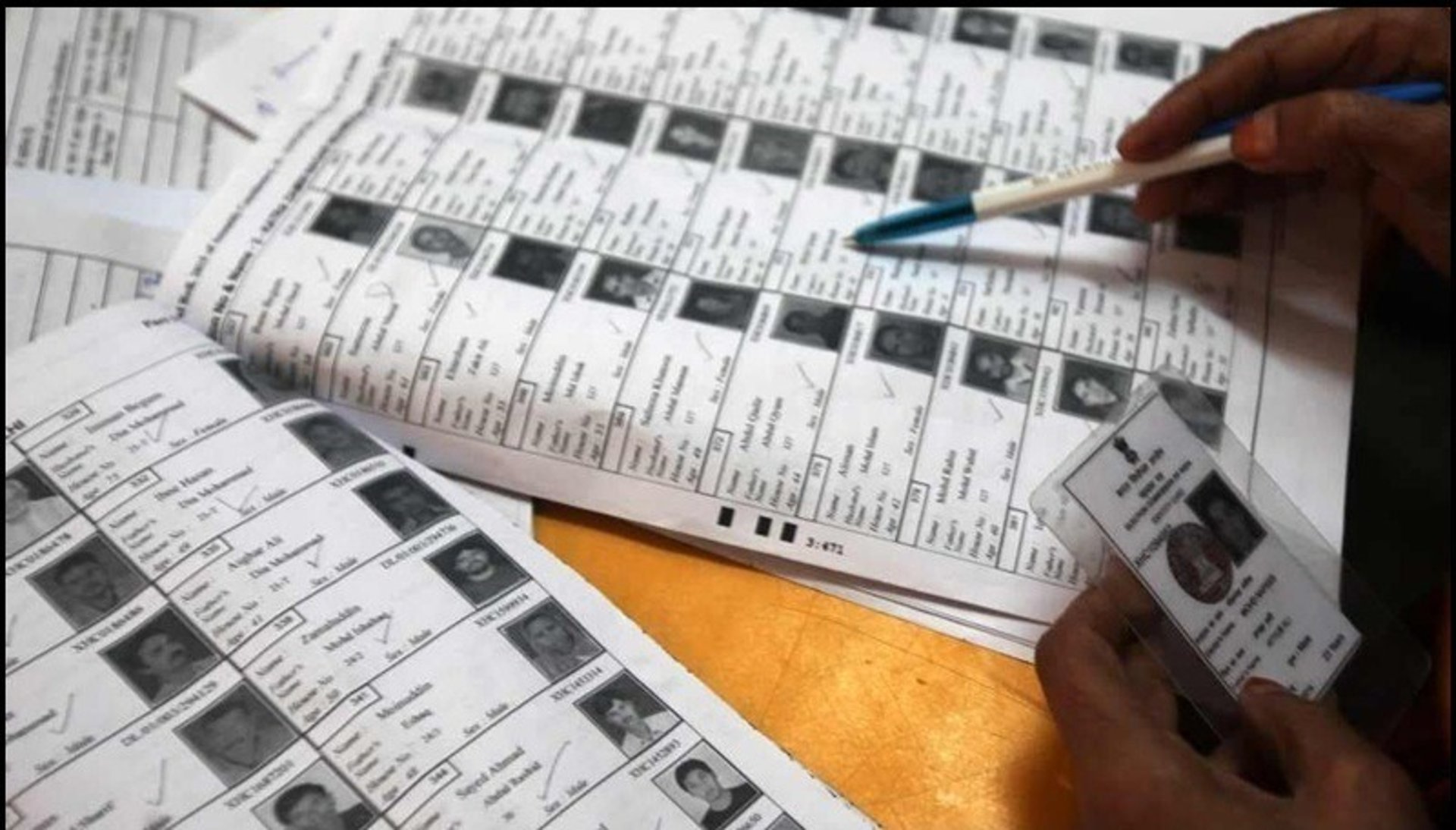
Stop Digital ID—Amend 339
HB 339 was presented as an "Election Integrity" bill, but its true purpose was to lay the groundwork for Digital ID in Idaho. It can't be stopped entirely, but statutes can be revised to reduce data collection and possible harms.
9/22/20259 min read
In this article we are going to discuss House Bill 339, Digital ID, and the Voter Registration software that is being used to collect data on all Idaho voters. Once we understand the way these are related we will have a better idea of how to stop Digital ID in Idaho.
The first part of this article shows how the personal data of all Idaho residents is being collected and processed by the Secretary of State's office, and how he justifies this collection. In the final section, legislation that can prevent invasive data collection and stop digital ID is proposed.
House Bill 339, Digital ID, and Voter Roll Software
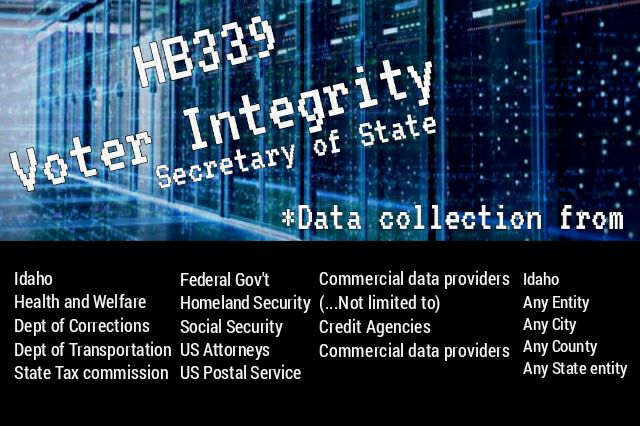

Digital ID and Mass Data Collection
In 2024, Idaho legislators passed House Bill 339. It replaced 34-433, a simple paragraph requiring the board of health to report data on deceased residents, with a long, complicated statute authorizing the Secretary of State to collect, store, and process almost unlimited amounts of information about all Idaho voters, and to share it with unnamed states, NGOs, and private corporations. It is shocking how broad-ranging this bill is, and how much collection and sharing of personal data is allowed.
HB 339 was presented as an "Election Integrity" bill, and was given a pass recommendation by the state affairs committee. It appears that some legislators did not investigate the bill thoroughly, and went along with it. But HB 339 was not only a colossal over-reach, but in terms of data collection, it does not effectively clean up voter rolls.

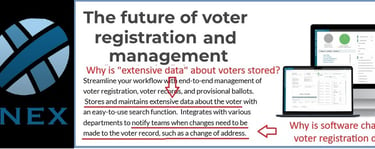
HB 339 should not have been passed, but now that it is in place, removing it will be challenging. These are a few things lawmakers should understand before crafting legislation.
1) It's All About Digital ID. The true purpose of HB 339 is obviously to collect data for the purpose of implementing a nationalized system of digital ID. HB 78, the bill intended to provide for electronic driver's licenses did not authorize collection of any data. Instead, data collection was assigned to HB 339, using "voter roll integrity" as an excuse. The open-ended manner in which HB 339 is written, to allow for the broadest possible collection and sharing of data, shows the bill's true purpose. It is very suspicious that AAMVA, an NGO closely associated with Digital Driver's Licenses, is already a contractor for the Secretary of State, and already has access to Idaho voter rolls.


2) Idaho's Voter Roll Maintenance Software provides for Mass Data Collection and Storage. The company that runs Idaho's election management software is Tenex Software Solutions. If you go to its web page, and review the description of its All Inclusive Voter Management Platform, it is clear that the Tenex "Voter Central" database stores and processes "extensive data about voters", including much, much more information than what relates directly to voter registration. Why is this?
It is true that County Clerks need access to a certain amount of data from other agencies (such as SSA, and INS) to verify registrations. But there is no need to store this data permanently. It seems as if the main purpose of HB 339 was to populate the expansive Tenex Software database rather than to actually verify voter rolls. Is this type of data collection being done nationally, and who decided this was a good idea for Idaho?
3) Who is Behind Tenex Software Solutions? By initial appearances it seems that Tenex is the entity pushing mass data collection and driving the Digital ID Bus. But when you examine the company a little closer, that is not the case. As we proved in the article Phantom Election Management Software, Tenex did not develop the voter management software that it supports for the Idaho SOS. It appears to be a "systems integration" company that is licensing the software from another unknown company.
We don't know who wrote the Tenex "Voter Central" software, but it seems to be the same anonymous entity that controls voter registration lists in many other states. If this is so, then it is almost certainly responsible for the registration fraud algorithms that Dr. Douglas Frank has proven are operating in all 50 states. And if our voter registration data is not secure, then how could any personal data stored by the system be secure, and how could digital ID be secure? These are disturbing questions with no good answers.
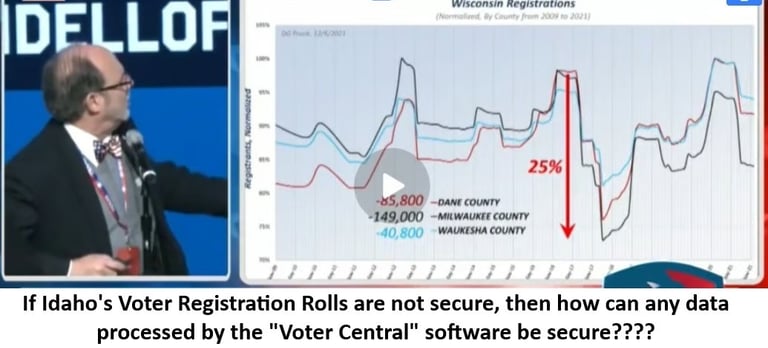

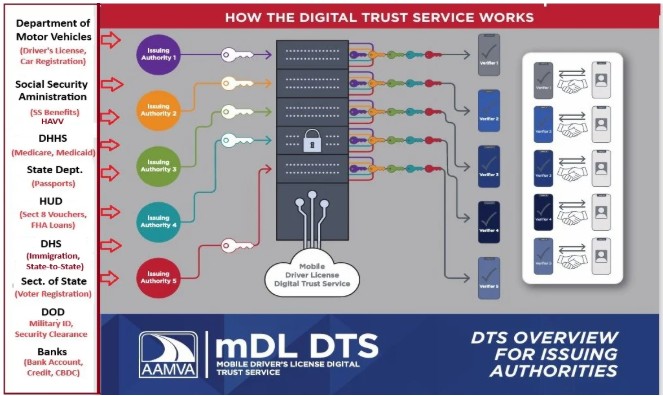

Why is Mass Data Collection needed for Secure Elections?
Mass Data Collection—It is mind-boggling how much data House Bill 339 allows the Secretary of State to collect about every Idaho voter. The text of HB 339 is Here.
The bill starts by expanding the collection of data from agencies it already has the means to obtain data from: Dept. of Health and Welfare, DMV, Social Security, DHS, Post Office, and Department of Corrections.
It then goes wildly off the rails, demanding unlimited information from agencies with no direct bearing on registration status. It authorizes the SOS to share the data collected and "enter into contracts" with unspecified agencies, NGOs, credit agencies and data providers—and there is no explicit wording in the bill that limits what can be done with the data, or who can access it.
Controlling the Narrative—Anyone who reads the complete text of HB 339 can see the problems, but few people actually read legislation. That allows the promoters of mass surveillance to claim the bill made elections more secure. State Officials are already pushing the story that investigating tax records has led to arrests.
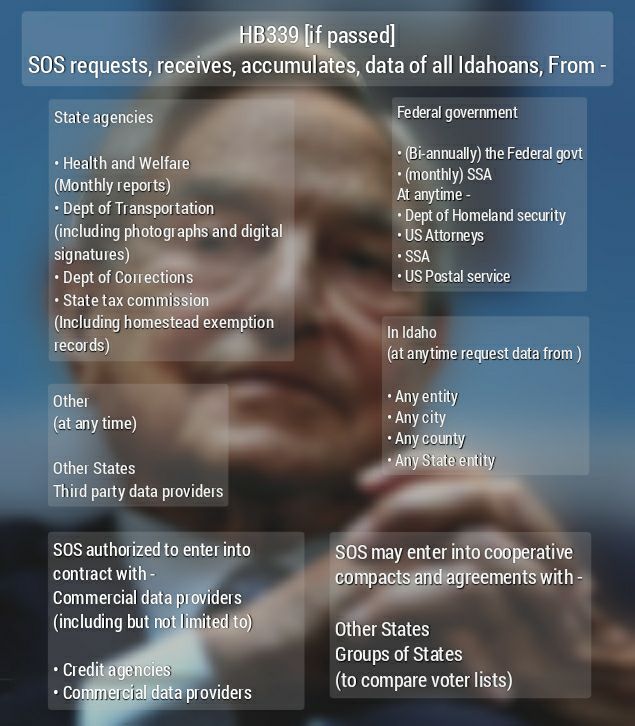

One of the things that the Secretary of State does to divert attention from the serious threats to our election system posed by centralized, computerized election systems, is to focus on individual cases of voter fraud. But this is just a distraction. Arresting a few non-citizens for voter fraud, or prosecuting vacation home owners for voting "illegally" at their summer home, will not address the real threat to our election systems, which is rogue election software. Expect more highly-publicized arrests of "illegal voters" in the coming months as the SOS tries to justify the invasive collection of data on all Idaho voters.
Legislative Remedies for House Bill 339
Preventing the adoption of Digital ID requires revising 34-443, the Idaho statute that was modified by HB 339. But that is not all that must be done. Several of the suggestions made in the article Legislative Fixes to Election Fraud, are also necessary to reign in collection of voter Information. In particular, electronic registration must be eliminated altogether, since it is impossible to clean up Idaho voter rolls as long as bots can use online registration to continually create new fraudulent registrations.
In terms of reigning in HB 339, it would be ideal to rescind the entire bill, and return 34-443 to its previous form. However the following amendments to 34-433 are suggested because they target areas where HB 339 clearly oversteps all rational boundaries, and provides the SOS almost unlimited license to collect data for which there is no justification.
1) All Data collected must be specified and limited; no open-ended data collection. There are nine incidents where the term "all data relevant to determining the accuracy of voter registrations, including, but not limited to . . . ." legal names, birthdate, etc. In all cases the text should be amended to read "including and limited to . . . ." This change should be made in paragraphs 1-a-i, 1-a-ii, 1-b-ii, 1-b-iii, 1-b-iv.
2) Disallow collection of data from unspecified institutions, government offices, corporations, and data providers. 1-b-v allows the SOS to collection data from "any entity, including . . . state entities, other states, and third-party data providers subject to the jurisdiction of the state of Idaho." This is colossal over-reach. Eliminate 1-b-v. (the entire paragraph) !!!!!!!
(1)(b)(v) At any time and at the discretion of the secretary of state, request from any entity, including cities, counties, state entities, other states, and third-party data providers any information that would assist in ensuring the integrity of Idaho’s voter registration information, verify voter eligibility, and verify United States citizenship status, including dates of birth, driver’s license numbers, addresses, and death records. Entities located in or subject to the jurisdiction of Idaho subject to the provisions of this subparagraph shall comply within thirty (30) days of the secretary of state’s request.
3) Disallow the sharing of data with Commercial Data Providers and credit agencies. The first part of 34-433-2 allows the SOS to enter into cooperative contracts with "states and groups of states" to identify individuals who are registered to vote in more than one state. Some such contracts with other states could be justified. But the second part gives these "groups of states" the right to "determine the current residence of each individual" (even those that are NOT registred in more than on state), and allows the sharing of personal information with private commercial data providers and credit agencies. There is no legitimate justifcation for second-guessing residency of people who maintain homes in two states (as long as they only vote in one state), and there is no justification for sharing registration data with credit agencies or commercial data providers EVER . Delete section 2, from "to maintain the accuracy . . . "
(2) The Secretary of State may enter into cooperative compacts and agreements with other states or groups of states to compare voter lists, to identify individuals who are registered to vote in more than one state. to maintain the accuracy of voter lists, and to determine the current residence of each such individual to verify such individual’s eligibility to remain registered to vote in Idaho. The secretary of state is authorized to contract with commercial data providers, including but not limited to credit agencies and commercial data providers, to assist the secretary of state’s efforts in verifying and auditing information in voter registration lists, including but not limited to citizenship status and residence; provided, however, that the secretary of state shall not disseminate sensitive personal data to commercial data providers and credit agencies in its contracts.
4) Data received by the SOS shall be deleted from the SOS server no more than 30 days after it has been processed. 34-433-5 allows the data collected by the SOS for the purpose of voter roll verification to be retained for up to 30 days after it has been processed, but does not require that it be deleted. Section 5 should be modified to guarantee no data will be stored more than 30 days after it is processed. And sharing of data for unauthorized purposes must be explicitly prohibited.
(5) The Secretary of State shall process voter registration data and in a secured cloud system using cryptography standards consistent with federal regulations. Voter registration verification requests pursuant to this section approved by the Secretary of State shall be processed on a dedicated secured system where all access and activity are logged. Data received and processed by the Secretary of State and used for verification purposes pursuant to this section shall be retained for thirty (30) days or until properly processed pursuant to the provisions of this section, and then deleted permanently from all servers. No data collected for the purpose of voter registration verification shall be stored or processed by agencies associated with digital identification or used for any unauthorized purposes.
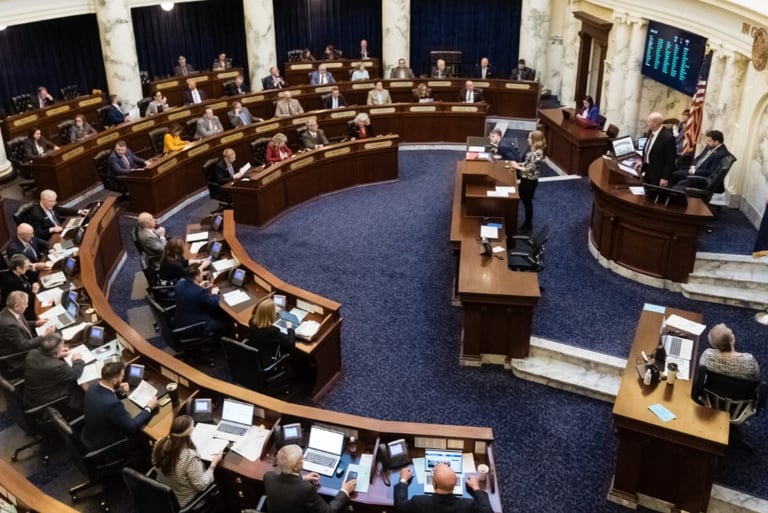

We believe the following changes should also be made to 34-433, but they are less essential than the previous four. Long term, the entire Voter Registration software platform should be replaced with a less centralized, more transparent method of voter records management. But in the short term, the goal is to rein in unjustifiable data collection.
5) Disallow collection of data from unspecified Federal Agencies. 1-b-iv allows the SOS to collect data related to voter registration as needed from the following Federal agencies : DHS, US Attorney General, SSA, USPS. This information can be used to verify registration data at the time of application. 1-b-ii requests biannual data from the "Federal Government" but does not specify or limit the federal agencies it refers to. This request for information is either redundant or open-ended. Eliminate 1-b-ii.
6) Disallow the collection of state tax records. 1-b-1 allows the SOS to collect tax records from the State Tax Commission to make sure people are registered to vote at the home they claim as their primary residence. However, there are allowable exceptions (nursing homes, schools, long term employment contracts, family separations, etc.), and guidelines for enforcement are not clear. Eliminate 1-b-i
Most people already know that centralized data collection and Digital ID are threats to individual liberty, but for those who would like more information, the following articles provide it.
Data Collection Disguised as Election Integrity—Shows how HB 339 provides for mass data collection on all Idaho voters, but fails to clean up voter rolls.
Letter to Senate State Affairs Considering HB 339—Contents of a letter written against HB 339 when it was being considered by the Senate State Affairs Committe.
Digital Identities: Who Verifies the Verifiers—Shows that the push for Digital Driver's Licenses is coming from a private corporation that controls digital verification services.
Phantom Election Management Software—Shows that the Tenex Election Management software running in the SOS office is of dubious origin, and has centralized control of almost all Idaho election data.
Empowering Voters
Advocating for transparent, honest, and decentralized voting systems.
Please subscribe to the Eye on Elections Newsletter.
Contact us:
© 2025. All rights reserved.
